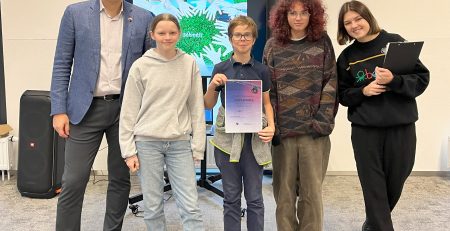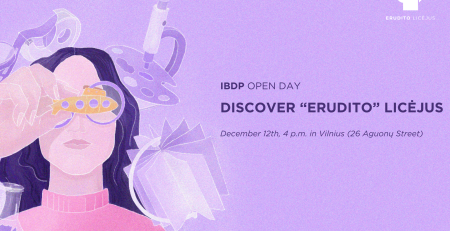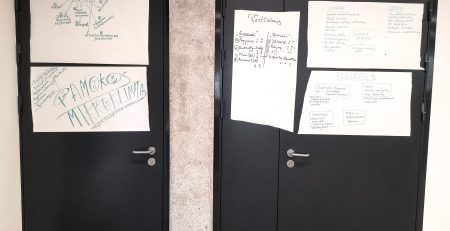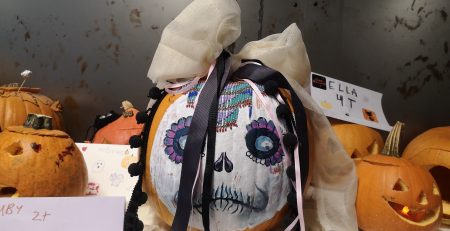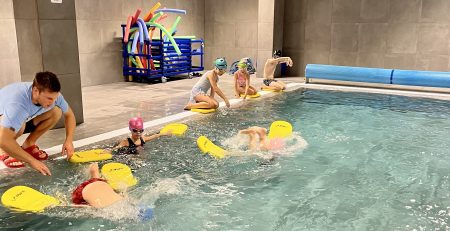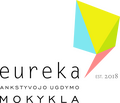
“DIGIT4SEN” Coordinator Rūta Petkevičiūtė: How Digital Tools Facilitate Learning and Enrich Lessons
Erudito2023-11-21T10:11:35+03:00“Erudito” licėjus have been participating in the “Erasmus+” project “DIGIT4SEN” (2021-1-LT01-KA220-SCH-
Rūta, how would you describe this project to someone who has never heard about it before?
That’s a great question, especially considering I joined and became the coordinator in the middle of the project. I would say this project aims to assist teachers (no matter where they live or teach) in making their lessons engaging for students of all ages. It particularly aids teachers working with students who may find traditional classroom settings challenging or require more individualized attention. The project’s goal is to create an accessible platform for all teachers offering online courses on preparing interactive lessons, assignments, and a library where teachers can share their tasks. This library contains over a hundred tasks in Lithuanian, English, Turkish, Spanish, and even Bulgarian. Teachers can use these tasks as examples or share their best practices and upload their created tasks using digital tools.
Why did “Erudito” licėjus decide to join this project and when?
The pandemic significantly influenced the inception of this project. As teachers needed to transition to virtual learning, which was unexpected and challenging for many, especially when dealing with students with special needs, we brainstormed ideas on how to help and engage these children even in remote learning. After the pandemic, we realized the ongoing relevance of the project. We still need to adapt to the evolving education and digitalization. Teachers are compelled to rapidly enhance their skills, adjusting to new student needs, educational demands, and technologies.
The aim of this project is not just to demonstrate how to make lessons more engaging and appealing but also to improve teachers’ skills in working with students with special needs. How do various digital platforms and programs help organize lessons more efficiently? I believe an interactive lesson is an engaging one. Regardless of the student, modern society is a digital one. Just a few days without internet in Turkey made me realize its exceptional importance and necessity. Children and technology are rapidly evolving, and teachers must adapt to emerging needs, knowledge, and the changing digital world. Digital platforms or programs make it easier and faster to engage students. If a student is engaged, the outcome of the lesson will be better.
One of the project outcomes is a handbook compiling theoretical material gathered from teachers in four different partner countries on how they apply digital platforms in their lessons. How do teachers from other countries fare in implementing various digital platforms in their teaching?
The handbook is indeed an amazing tool, especially for novice teachers or those starting to work with classes requiring differentiated tasks adaptable to various students. Since we collaborate with partners who have been working with SEN (Special Educational Needs) students for several years, I can say it has significantly enriched our project. In March, we organized a three-day training session in Kaunas for all partner country teachers on using digital tools. They acknowledged receiving a lot of knowledge and pledged to apply it in their lessons.
You previously mentioned the creation of a digital library during the project, containing exemplary lessons and tasks from our teachers, gaining new insights about the application of digital platforms in lessons. How challenging has it been to develop this tool? What experiences have you gained?
The library has already been created, and currently, we are uploading the initial lessons from all project partner countries. Our goal is for a teacher to complete our four-module course, take various quizzes/tests, and try creating lesson materials using at least one tool. This tool is an invaluable aid for teachers lacking ideas or struggling with tasks, especially in classes where students face learning difficulties.
Are many of our teachers’ lessons and tasks available in the digital library?
At present, around 30, maybe slightly more, including about ten in English. And these are just lessons created by our school’s teachers! The positive feedback, the delight teachers express when students enjoy the lessons they have created using different programs, is unreal. The goal of the digital library is to open it to all after the December conference, allowing teachers to share experiences (and tasks) with each other. We aim to increase the library’s resources and create an easily accessible tool for lessons in any situation.
You mentioned the upcoming final conference of the project, happening soon. Tell us more about what we can expect from it.
The final conference of this project will take place in Kaunas on December 6. Teachers and anyone interested in education and learning can already register. There will be a wealth of high-quality new knowledge (I promise your brain won’t explode), new acquaintances, and enjoyable time spent together with like-minded individuals. For me, this conference isn’t just about presenting the results of “DIGIT4SEN” but about spending time together, discussing boldly about lessons, especially when we encounter difficulties teaching students with special needs, about differentiating tasks for students at various levels and still engaging all students. For me, this conference is about sharing good practices – about the opportunity to learn and improve in an area that is constantly changing – digitalization is advancing, and teachers are the leaders shaping the future world.
You’ve just returned from the project internship in Turkey, where you and the partners finalized the last steps of the project and discussed possibilities for future collaboration. What were your impressions?
Well, Turkey is not for me (laughs). But on a serious note, we worked intensively for two days – discussing, planning, and finalizing everything. There were discussions about project communication, attracting teachers, and future prospects after the project ends. There’s still much work ahead, but time is limited, yet the result is very beautiful and meaningful. Perhaps DIGIT4SEN #2, an enhanced version, awaits…
What are your favorite digital platforms or tools that you’ve discovered or found during this project?
Honestly, I’ve wanted to learn how to edit YouTube videos for a long time, not necessarily for lessons, but out of personal interest. And, surprise, surprise, our last module specifically teaches that. I was also amazed at the number of functions in PowerPoint, functionalities I never imagined existed – did you know that this tool can be used to create animated movies?
“Erasmus+” is a European Union funding program providing learning and improvement opportunities for individuals of various ages, statuses, professions, and organizations, institutions, and entities to implement projects meeting the program’s criteria. The “DIGIT4SEN” project is dedicated to teachers, providing them with the opportunity to diversify their subjects, make them attractive and interesting, especially for those teaching students with special educational needs (SEN). After the project, teachers will be able to create interactive lessons tailored to students’ abilities and existing health issues.



